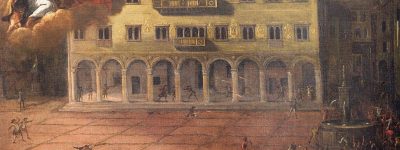Public Renaissance: Urban Cultures of Public Space between Early Modern Europe and the Present (Pure)

The central concept of this project, funded by Humanities in the European Research Area (HERA), is that of a “PUblic REnaissance” (PURE): from this point of view, PURE intends to examine the urban cultures of public space in the early modern era, and to set this into a dynamic dialogue with the debate around the agency of public space, specifically in shaping contemporary events.
By proposing a cross-chronological enquiry, PURE explores and reveals how the past is inscribed in the material culture of the public spaces we still inhabit, and how contribute to shaping actions and events in the present. Our project considers the early modern period (c. 1450-1700) in the urbanized heart of Europe, with particular attention to case examples between the Netherlands, Germany, Spain, Italy and England.
Working with an interdisciplinary team of architectural, social and cultural historians, in collaboration with non-academic partners from the museum/heritage sector, the project will probe the continuities and ruptures that shape urban spaces of the past in relation to contemporary urban interaction. In addition to primary archival research methods, we will work with locative media technologists to create smartphone apps that enable an engagement with histories of place. While historical enquiry is at the heart of the project, through digital tools and interaction with regional city museums, the aim is to communicate the memories and meanings of public space in European cities.
At the Italian-German Historical Institute, in particular, we will develop a smartphone app (Hidden Trento), dedicated to iconic and little-known places in the city, and at the same time we will investigate, through unpublished archival investigations, how in Renaissance italian cities – Venice, Padua, Bologna, Verona and Brescia – public opinion was born in the early modern age, focusing on the relationships between communication and public spaces such as squares, markets, shops and taverns.
Academic partners: University of Exeter, Rijksuniversiteit Groningen, Universitat de València, Friedrich-Alexander Universität Erlangen-Nürnberg
Funded by: Humanities in the European Research Area (HERA)
Hidden Trento – the city of the Council within reach of an APP
Partners accademici: University of Exeter, Rijksuniversiteit Groningen, Universitat de València, Friedrich-Alexander Universität Erlangen-Nürnberg, Museo per via di Pieve Tesino (TN)
Ente finanziatore: Humanities in the European Research Area (HERA)



